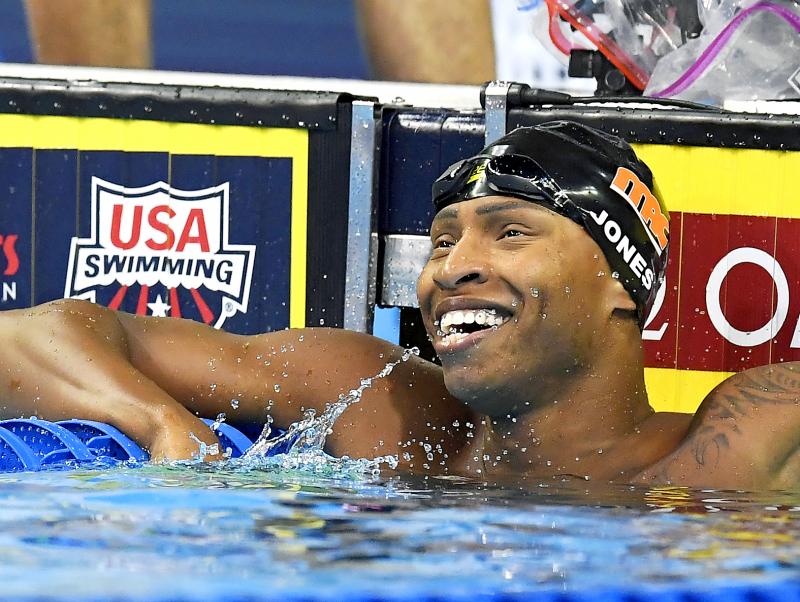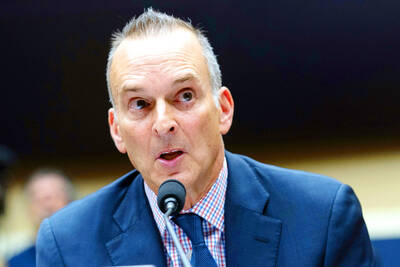Cullen Jones still remembers the first time he really felt hate at a swimming pool.
He was a teenager growing up in New York City, competing for the first time at higher-level meets where he stood out as one of the few black swimmers.
“I definitely felt different,” Jones said in an interview at the US Olympic trials. “When I was 15 years old, I finally won a big race. I beat this white kid. Well, his mom walked by and said: ‘Oh, shouldn’t you be playing basketball?’”

Photo: AP
Swimming worked out for Jones, who would gladly show off his four Olympic medals — two of them gold — and three other medals he earned at the world championships during his long career.
Still, not nearly enough swimmers of color have followed his path, which stifles the sport’s ability to expand beyond the perception that it is largely confined, at least in the US, to wealthy, predominately white suburbs.
At the Olympic trials, where hundreds are competing for a trip to the Tokyo Games, it is impossible to ignore that hardly anyone of color is diving in.
There are only a handful of exceptions, despite USA Swimming’s efforts to diversify its pool of athletes.
Simone Manuel became the first black woman to win an individual gold medal in swimming at the 2016 Rio Games. Eighteen-year-old Torri Huske, whose mother is Chinese, looks like one of the rising stars of the US program. Natalie Hinds became the first black swimmer to make this year’s Olympic team when she finished fourth in the 100m freestyle on Friday night, locking up a spot in Tokyo as a relay swimmer.
In the past few years, USA Swimming has devoted much of its attention to the “Make a Splash” initiative, which provides opportunities for more children, especially those in underserved communities, to learn how to swim.
Tim Hinchey, president and CEO of USA Swimming, said that the racial unrest in the wake of George Floyd’s killing by a Minneapolis police officer brought to light that more needed to be done.
Hinchey said that he want more kids of color to see swimming as a potential avenue to university scholarships and athletic success at the highest levels.
“We’ve realized that we’re missing a piece,” Hinchey said, which is “finding ways to make swimming not just something that saves your life and something that’s a sport for life, which is important to all of us, but a way to convince young kids of any place, of any color, any shape, any size, any ethnicity, to know that swimming can be your sport.”
Over the next seven years, USA Swimming plans to divert funding that goes toward learn-to-swim programs at local clubs that are making strides to diversity the sport, such as the Chicago Park District swim team and the DeKalb Aquatics Tiger Sharks near Atlanta.
TEAM BLAC
Jones, Manuel and other black swimmers, such as Lia Neal, who recently retired after winning two Olympic medals during her career, have joined together to form Team BLAC, the Black Leadership in Aquatics Coalition.
Jones said he had always strived to stay out of highly charged debates involving political and social issues, but as racial unrest spread across the US last summer, he decided he could not stay silent any longer — especially when he was subjected to police profiling not more than 24 hours after Floyd’s death.
While out walking his dog in a predominately white neighborhood, a police cruiser went by.
“Suddenly, I hear screeching tires and he’s coming back to me,” Jones said. “I did not fit his description of who should’ve been in that area.”
Jones was able to diffuse any tension by talking about his dog, but said he was shaken by the encounter.
“I was blown away by that,” Jones said, adding that he worried about the potential impact on his 2-year-old child. “As a new father, I now have to teach my son how to verbally disarm someone with a gun.”
He called up Neal, a fellow New Yorker. They contacted other black swimmers, including Manuel.
The group enlisted the support of USA Swimming, which now has a section on its Web site devoted to diversity and inclusion, including a link to Team BLAC.
Neal said it was important for prominent black swimmers to let those coming up through the ranks know that “hey, we see you, we stand with you, we’re trying to do what we can do to help you.”
It was time to take a stand, she said.
“It’s so easy for athletes to just stay within the scope of their sport and not trudge into political territory,” Neal said. “It’s a very iffy space. You don’t want to step on anyone’s toes, but this is just too important not to say anything.”
‘BRUTAL’ YEAR
The burden of being a black person in the US, not to mention a black swimmer, can take its toll.
After Manuel failed to make the US team in the 100m freestyle on Thursday night — which means she would not have a chance to defend the historic gold medal she won five years ago — she revealed that she had been diagnosed with overtraining syndrome.
“I do think that being a black person in America played a part in it,” said Manuel, who still has a shot to make the team in the 50m freestyle. “This last year for the black community has been brutal, and I can’t say that wasn’t something that I saw. It’s not something I can ignore. It was just another factor that can influence you mentally in a draining way.”
Much of that attitude can be traced to racial barriers that were placed in their way over the years, such as inner-city pools that closed rather than integrate or even more horrific incidents that made it clear they were not welcome.
Long-term discrimination has undoubtedly contributed to the fear that many African Americans have about getting in the water.
Jones felt that from his mother growing up. After he nearly drowned at age 5, she insisted he take swim lessons.
“When someone knows how to swim, there’s not even a thought of not teaching that to their children,” Jones said. “We need to break the cycle of generational fear. All kids love to be in the water when it’s hot, but so many parents have their own fears. They treat the water like fire. They’re like: ‘Ah, it’s hot, stay away.’ Naturally, their kids build up a resentment of the water, too.”

Revelations of positive doping tests for nearly two dozen Chinese swimmers that went unpunished sparked an intense flurry of accusations and legal threats between the World Anti-Doping Agency (WADA) and the head of the US drug-fighting organization, who has long been one of WADA’s fiercest critics. WADA on Saturday said it was turning to legal counsel to address a statement released by US Anti-Doping Agency (USADA) CEO Travis Tygart, who said WADA and anti-doping authorities in China swept positive tests “under the carpet by failing to fairly and evenly follow the global rules that apply to everyone else in the world.” The

Taiwanese judoka Yang Yung-wei on Saturday won silver in the men’s under-60kg category at the Asian Judo Championships in Hong Kong. Nicknamed the “judo heartthrob” in Taiwan, the Olympic silver-medalist missed out on his first Asian Championships gold when he lost to Japanese judoka Taiki Nakamura in the finals. Yang defeated three opponents on Saturday to reach the final after receiving a bye through the round of 32. He first topped Laotian Soukphaxay Sithisane in the round of 16 with two seoi nage (over-the-shoulder throws), then ousted Indian Vijay Kumar Yadav in the quarter-finals with his signature ude hishigi sankaku gatame (triangular armlock). He

RALLY: It was only the second time the Taiwanese has partnered with Kudermetova, and the match seemed tight until they won seven points in a row to take the last set 10-2 Taiwan’s Chan Hao-ching and Russia’s Veronika Kudermetova on Sunday won the Porsche Tennis Grand Prix women’s doubles final in Stuttgart, Germany. The pair defeated Norway’s Ulrikke Eikeri and Estonia’s Ingrid Neel 4-6, 6-3, 10-2 in a tightly contested match at the WTA 500 tournament. Chan and Kudermetova fell 4-6 in the first set after having their serve broken three times, although they played increasingly well. They fought back in the second set and managed to break their opponents’ serve in the eighth game to triumph 6-3. In the tiebreaker, Chan and Kudermetova took a 3-0 lead before their opponents clawed back two points, but

Taiwanese gymnast Lee Chih-kai failed to secure an Olympic berth in the pommel horse following a second-place finish at the last qualifier in Doha on Friday, a performance that Lee and his coach called “unconvincing.” The Tokyo Olympics silver medalist finished runner-up in the final after scoring 6.6 for degree of difficulty and 8.800 for execution for a combined score of 15.400. That was just 0.100 short of Jordan’s Ahmad Abu Al Soud, who had qualified for the event in Paris before the Apparatus World Cup series in Qatar’s capital. After missing the final rounds in the first two of four qualifier